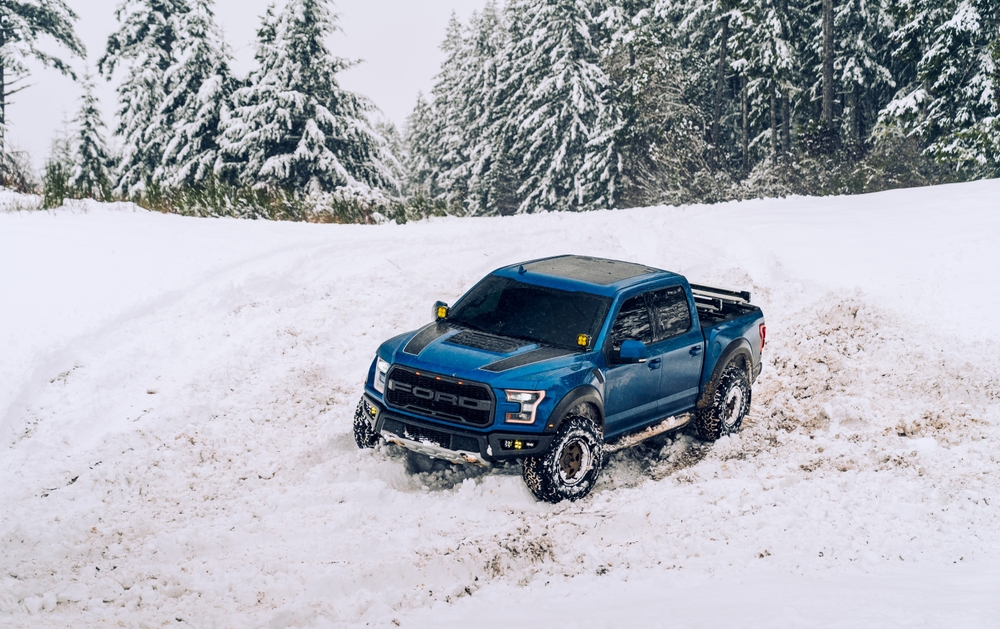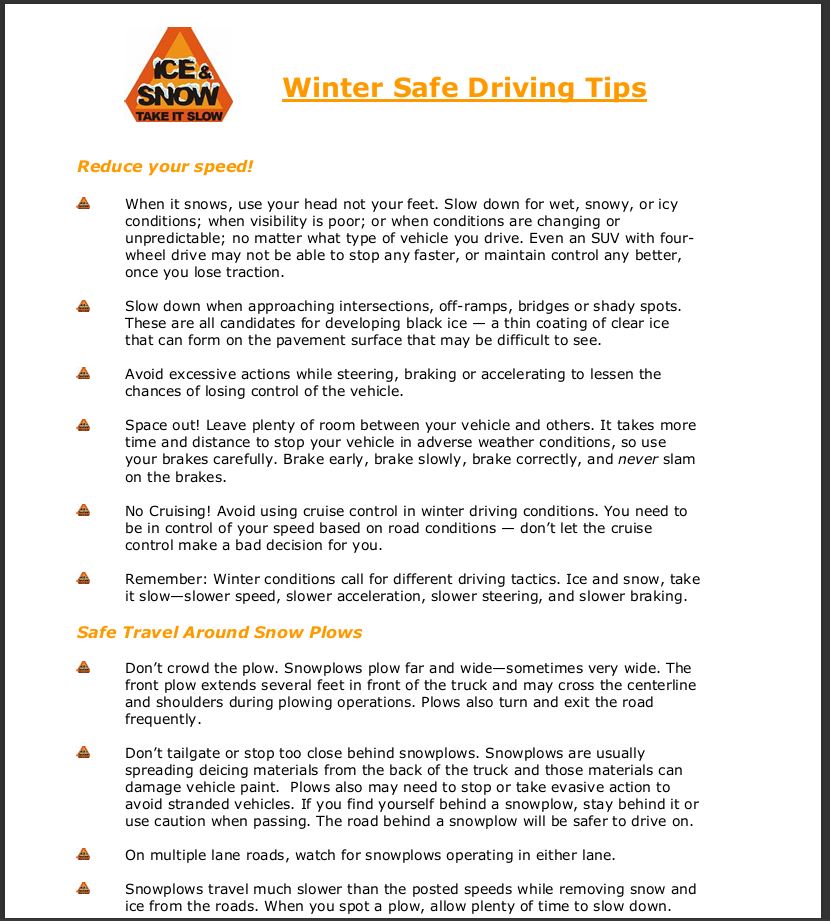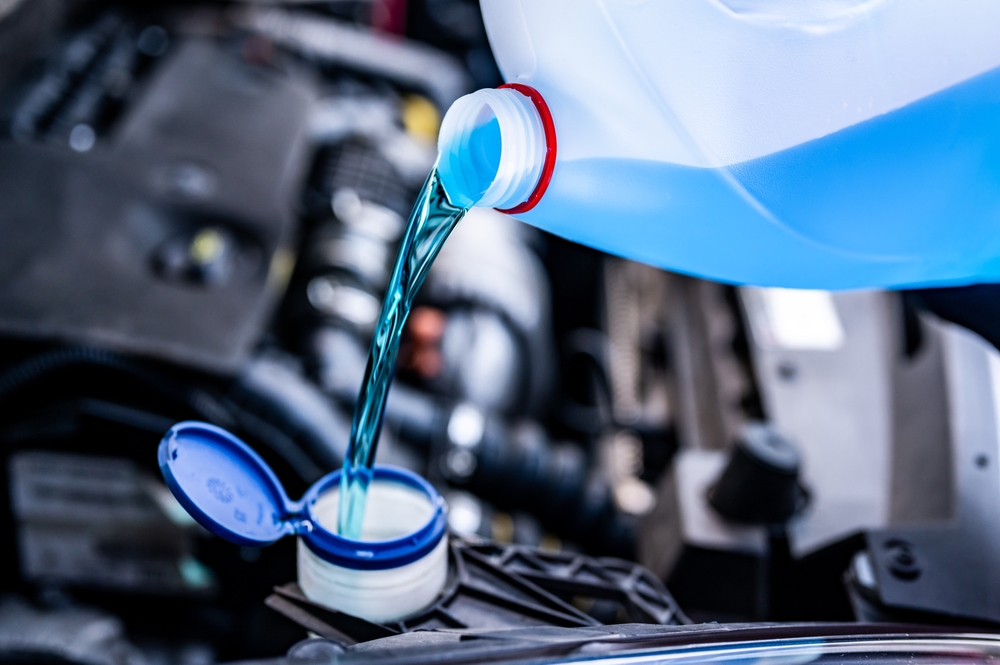Tennessee winters aren’t predictable. One day you’re enjoying 55-degree sunshine in Franklin, the next morning your windshield’s coated in ice and your engine’s struggling to turn over. While we don’t typically see weeks of heavy snow like northern states, those sudden cold snaps—especially when temperatures plunge into the teens overnight—can absolutely wreck your Ford if it’s not properly prepared. The difference between a reliable truck that starts every morning and one that leaves you stranded in a Kroger parking lot often comes down to five critical fluids that need attention before the cold really hits.
Most Ford owners know they should “winterize” their vehicle, but they’re not always sure what that actually means beyond checking the battery. The truth is, your fluids are just as important—maybe more so. Cold weather thickens oil, dilutes antifreeze, and introduces moisture into brake lines. Each of these issues can silently damage your engine or compromise your safety. At Ford of Franklin Service, our factory-trained technicians see preventable winter breakdowns every year, and almost all of them trace back to fluids that weren’t checked or changed when they should have been. This guide walks you through exactly what your Ford needs to handle a Tennessee winter—and why each fluid matters more than you might think.
Why Your Ford Needs a Tennessee-Specific Winter Fluid Check
You might be wondering why Franklin needs a “winter prep guide” when we’re not exactly dealing with Minnesota-level cold. Here’s the thing: Tennessee’s unpredictable freeze-thaw cycles are actually harder on your Ford than consistent cold. When temperatures swing from 50 degrees down to 18 overnight—which happens regularly between December and February—fluids expand and contract rapidly, seals get brittle, and condensation builds up inside systems that should stay dry. The Tennessee Department of Transportation emphasizes that our winters demand just as much vehicle prep as colder climates, precisely because drivers here are often caught off guard.
Middle Tennessee also gets its share of ice storms, particularly in January and February. Black ice on I-65 or Highway 96 is no joke, and your Ford’s ability to stop safely depends entirely on properly maintained brake fluid and responsive systems. Beyond safety, there’s the practical reality that a breakdown in cold weather isn’t just inconvenient—it’s genuinely dangerous. When your F-150 won’t start at 6 a.m. because the oil’s too thick or your coolant mix isn’t strong enough, you’re not just late for work. You’re potentially stuck in freezing temperatures waiting for a tow. A 30-minute fluid inspection now prevents hours of frustration later, and it keeps your Ford running exactly the way it should all winter long.
The 5 Critical Fluids Your Ford Can’t Live Without This Winter
Your Ford relies on five essential fluids to function properly in cold weather. Each one serves a specific purpose, and each one reacts differently to Tennessee’s winter temperatures. Skipping even one of these checks leaves your vehicle vulnerable to damage, reduced performance, or complete failure. Here’s what you absolutely need to verify before the next cold front rolls through Franklin.
1. Antifreeze (Coolant): Your Engine’s First Line of Defense
Antifreeze does exactly what its name suggests—it prevents your engine from freezing solid when temperatures drop below 32 degrees. But it’s not just about avoiding a cracked engine block (though that’s definitely part of it). Your coolant also prevents overheating year-round, protects against corrosion, and lubricates your water pump. In winter, the wrong coolant concentration can leave you with a useless engine, even in relatively mild Tennessee cold.
Most Ford vehicles need a 50/50 mix of Motorcraft® antifreeze and distilled water. This ratio protects your engine down to about -34 degrees Fahrenheit—far colder than Franklin ever gets—while also maintaining optimal corrosion protection. The problem is that coolant degrades over time. If you haven’t changed it in three years, the protective additives break down, and the freeze protection weakens considerably. Even worse, if someone topped off your system with plain water during the summer (a common shortcut), your protection level drops dramatically.
Our technicians can test your coolant’s concentration in just a few minutes using a refractometer. If it’s weak, we’ll drain the old mixture and refill it with genuine Ford coolant that’s formulated specifically for your engine’s materials and operating temperature. This isn’t something you want to guess about—if your coolant freezes, the expanding ice will crack your engine block, and you’re looking at a complete engine replacement rather than a simple fluid change.
2. Winter-Grade Engine Oil: Keeping Your Engine Healthy in the Cold
Oil gets thicker when it’s cold. That’s basic physics, but it has real consequences for your Ford’s engine. When you turn the key on a 20-degree morning, thick oil doesn’t flow quickly enough to lubricate critical engine components during those first few seconds of operation. That brief delay causes measurable wear on your engine, and over time, it adds up to reduced performance and shortened engine life.
The fix is surprisingly simple: use the right oil viscosity for winter temperatures. Most modern Fords run on 5W-20 or 5W-30 oil year-round, and that “5W” designation means the oil flows easily at low temperatures. If you’re still running conventional oil or you’re overdue for a change, now’s the time to switch to a fresh fill of synthetic or synthetic blend that’ll flow properly even when it’s freezing outside. Cold oil also loses its ability to suspend contaminants effectively, meaning dirt and metal particles stay in your engine longer, causing additional wear.
A professional oil change before winter hits ensures you’ve got the correct viscosity and fresh oil with all its protective additives intact. Our technicians use Motorcraft oil that meets Ford’s exact specifications, and we’ll also check your oil filter—because a clogged filter in winter means your engine’s working even harder to circulate thick, cold oil through restricted passages. It’s a small investment that prevents expensive engine damage down the road.
3. Windshield Washer Fluid: The Key to Winter Visibility
Windshield washer fluid sounds like the least critical winter prep item, but it’s actually one of the most important for safety. Regular blue washer fluid freezes solid around 32 degrees, and when it freezes in your lines or sprays onto a freezing windshield, you lose visibility instantly. That’s incredibly dangerous when you’re navigating icy roads or dealing with the glare from a low winter sun mixed with road salt spray.
Winter-grade washer fluid contains de-icers that keep it liquid down to -20 or -30 degrees, and it’s specifically formulated to cut through road grime, salt residue, and ice buildup. Tennessee roads get treated with salt and brine during ice storms, and that mixture creates a filmy coating on your windshield that regular fluid can’t remove effectively. You need the extra cleaning power that winter fluid provides, especially during those gray January mornings when visibility is already compromised.
Switching to winter fluid is easy—just drain your reservoir and refill it with the cold-weather formula. Don’t mix it with regular fluid, though, because that dilutes the freeze protection. If you’re not sure what’s currently in your system, our technicians can flush the lines and reservoir completely, then fill it with fresh winter-grade fluid that’ll keep your windshield clear no matter how cold it gets or how much salt spray you encounter on I-65.
4. Brake Fluid: Protecting Your Stopping Power from Moisture
Brake fluid is hygroscopic, which means it naturally absorbs moisture from the air over time. That’s a problem year-round, but it becomes genuinely dangerous in winter. When moisture-contaminated brake fluid gets cold, it can freeze in the brake lines, reducing your stopping power or causing spongy pedal feel exactly when you need precise braking control on icy roads. Even if it doesn’t freeze completely, water in your brake fluid lowers its boiling point, which can lead to brake fade and reduced effectiveness.
Most Ford owners don’t think about brake fluid until there’s a problem, but it should be flushed and replaced every three years regardless of mileage. If your brake fluid is dark brown or hasn’t been changed in recent memory, it’s almost certainly contaminated with moisture. Fresh brake fluid is clear or light amber, and it maintains consistent viscosity and performance even in freezing temperatures. That consistency translates directly to reliable stopping power when you hit a patch of black ice on Highway 96 or need to brake suddenly on a cold, wet morning.
Our complete brake service includes testing your brake fluid for moisture content and flushing the entire system if needed. We use DOT-approved fluid that meets Ford’s specifications, and we’ll also inspect your brake pads, rotors, and lines while we’re at it. Brakes are your primary safety system, and making sure the fluid is clean and moisture-free is just as important as having good pads and rotors—especially during Tennessee’s unpredictable winter weather.
5. Transmission Fluid: Ensuring Smooth Shifting on Icy Roads
Transmission fluid doesn’t get nearly enough attention during winter prep, but it thickens in cold weather just like engine oil does. When your transmission fluid is thick and cold, your Ford might shift roughly, hesitate between gears, or slip during acceleration. Those symptoms aren’t just annoying—they indicate that your transmission isn’t getting the lubrication and hydraulic pressure it needs, which causes unnecessary wear on expensive internal components.
Modern automatic transmissions are incredibly sophisticated, and they rely on precise fluid pressure and flow to operate correctly. Cold, degraded transmission fluid can’t provide that precision, especially during the first few miles of driving when everything’s still warming up. If you’ve noticed hard shifts or delayed engagement when it’s cold outside, your transmission fluid is almost certainly the culprit. Changing it restores smooth, responsive shifting and protects the transmission from premature wear.
Ford specifies particular transmission fluids for different models and transmission types, and using the correct fluid makes a measurable difference in performance and longevity. Our technicians know exactly which fluid your F-150, Explorer, Escape, or Mustang needs, and we’ll check the fluid level, condition, and color to determine if it needs changing. If your transmission fluid is dark or smells burnt, it’s definitely time for a flush—and doing it before winter ensures smooth, reliable shifting even when temperatures drop suddenly overnight.
Beyond the Fluids: Other Winter Checks Our Ford Techs Recommend
Fluids are critical, but they’re not the only things that need attention before winter. A truly comprehensive cold-weather prep includes a few additional checks that make a huge difference in reliability and safety. Here’s what else our technicians recommend checking before the next freeze hits Franklin:
- Battery Performance: Cold weather significantly reduces battery capacity—sometimes by as much as 50% when temperatures drop into the teens. A battery that’s marginal in October will fail completely in January. We offer a complimentary battery check that tests your battery’s cranking amps and overall health, so you’ll know if it needs replacing before you’re stuck in a freezing parking lot.
- Tire Pressure and Tread Depth: Tire pressure drops roughly one PSI for every 10-degree temperature decrease, which means your properly inflated tires in September are probably underinflated by December. Low tire pressure reduces traction on wet or icy roads and hurts fuel economy. We’ll check your tire pressure and adjust it to Ford’s recommended levels, and we’ll also measure your tread depth to make sure you’ve got enough grip for winter driving conditions.
- Wiper Blade Condition: Worn wiper blades leave streaks and fail to clear ice and sleet effectively. Winter-specific wiper blades have a rubber boot that prevents ice buildup in the blade mechanism, which keeps them working even during freezing rain. We’ll inspect your current blades and recommend replacements if they’re leaving streaks or chattering across the windshield.
- Belts and Hoses: Cold weather makes rubber brittle, and old belts or hoses are more likely to crack or fail when temperatures drop. A broken serpentine belt leaves you stranded immediately, and a split radiator hose dumps all your coolant onto the road in seconds. Our technicians will visually inspect your belts and hoses for cracks, soft spots, or wear, and recommend replacements if needed to prevent a winter breakdown.
- Cabin Air Filter: Your heater works harder in winter, and a clogged cabin air filter restricts airflow, making it harder to defrost your windows and keep the cabin warm. A fresh cabin air filter improves heater performance noticeably and keeps the air inside your Ford cleaner during the months when you’re running the heater constantly.
These additional checks take just a few minutes during a routine service appointment, but they prevent the most common winter breakdowns and safety issues. The National Highway Traffic Safety Administration consistently emphasizes that vehicle maintenance is your first line of defense against winter driving hazards, and that includes these often-overlooked items beyond just fluids.
Trust Franklin’s Ford Experts for Your Winter Prep
Winter vehicle prep isn’t something you want to leave to chance or tackle yourself with YouTube videos and questionable advice. Your Ford was engineered to tight tolerances with specific fluids and parts, and using the wrong products or skipping important checks compromises performance and safety. At Ford of Franklin Service, our technicians are factory-trained specifically on Ford vehicles, which means they know your F-150, Explorer, or Escape inside and out. They understand exactly which fluids your particular model needs, what the correct service intervals are, and what common issues to watch for during Tennessee winters.
We use genuine Motorcraft parts and fluids for every service, which ensures compatibility and protects your warranty if your Ford is still covered. Aftermarket fluids might seem like a money-saving option, but they’re not formulated to Ford’s exact specifications, and using them can actually void warranty coverage on certain components. Our parts are designed specifically for your vehicle, and they’re backed by Ford’s warranty for complete peace of mind. Plus, our service center is equipped with Ford-specific diagnostic tools and equipment that generic shops simply don’t have access to, which means we can identify and fix issues that other places might miss entirely.
Beyond technical expertise, we’re committed to transparency and straightforward communication. Our service advisors will walk you through exactly what your Ford needs, explain why each service matters, and give you honest recommendations without pressure or upselling. We know that trust is earned through consistent, honest service, and we’re focused on building long-term relationships with Ford owners throughout Franklin and the surrounding communities. Before you schedule your winter prep, check out our Ford service specials to see if we’ve got any current offers that can help you save on your cold-weather maintenance.
Ford Winter Fluid Check Overview
| Fluid Type | Why It Matters in Winter | Recommended Check Interval | Failure Risk Without Proper Maintenance |
|---|---|---|---|
| Antifreeze (Coolant) | Prevents engine block from freezing and cracking; maintains proper operating temperature | Test concentration annually; flush every 3 years | Cracked engine block, overheating, complete engine failure |
| Engine Oil | Maintains proper viscosity for cold starts; lubricates engine components immediately | Every 5,000-7,500 miles or before winter | Increased engine wear, poor cold-start performance, reduced fuel economy |
| Windshield Washer Fluid | Stays liquid in freezing temps; clears salt spray and road grime effectively | Switch to winter formula before first freeze | Frozen fluid lines, zero visibility during winter driving |
| Brake Fluid | Prevents moisture contamination that reduces stopping power in cold conditions | Flush every 3 years or when moisture detected | Reduced braking effectiveness, spongy pedal feel, potential brake failure |
| Transmission Fluid | Ensures smooth shifting when fluid thickens in cold weather | Check annually; change per Ford schedule (typically 60K-100K miles) | Rough shifting, transmission slipping, premature transmission wear |
Frequently Asked Questions About Winterizing a Ford
Q: What is the right antifreeze-to-water ratio for a Tennessee winter?
A: For most Ford vehicles, the recommended ratio is a 50/50 mix of coolant and distilled water. This protects your engine from freezing in temperatures well below what Tennessee typically experiences, while also protecting against corrosion. Our technicians can test your coolant’s concentration in minutes and adjust it if needed.
Q: Do I really need “winter” windshield washer fluid in Franklin, TN?
A: Yes, absolutely. Standard blue washer fluid can freeze on your windshield or in the lines during a cold snap. Winter-grade fluid contains de-icers that remain liquid at freezing temperatures, which is critical for clearing road salt and grime during an ice storm or frosty morning. It’s a small change that makes a big difference in visibility and safety.
Q: Will my new Ford F-150 or Explorer automatically adjust for the cold?
A: Modern Fords are built to be incredibly resilient, but they’re not immune to physics. Fluids still thicken, and battery performance still drops in the cold. A quick fluid and battery check ensures all systems—including your new vehicle’s—are ready and protected, safeguarding your warranty and your safety on Tennessee’s unpredictable winter roads.
Q: How often should I check my oil in the winter?
A: You should check your oil level at least once a month year-round. However, for winter, the type of oil matters more than the level. If you’re near your next service interval, it’s best to get an oil change before the coldest weather hits to ensure you have the correct viscosity for reliable cold starts and proper engine protection.
Schedule Your Ford’s Winter Fluid Check in Franklin, TN Today
Don’t get left in the cold this winter. The factory-trained experts at Ford of Franklin Service are here to ensure your Ford is ready for whatever Tennessee’s unpredictable weather brings, whether you drive a brand-new F-150 or a trusted Explorer that’s been serving your family reliably for years. We have the right diagnostic tools, genuine Motorcraft® parts and fluids, and specialized knowledge to handle complete winter prep efficiently and thoroughly.
With Franklin’s winter temperatures regularly dropping into the teens overnight and ice storms appearing with little warning, waiting to address fluid maintenance only leaves you vulnerable to breakdowns and safety issues when you need reliability most. Our comprehensive fluid inspection identifies exactly what your Ford needs—from coolant concentration to brake fluid moisture content—ensuring you get appropriate service that protects your vehicle rather than just surface-level checks that miss critical problems.
Click here to schedule your winter fluid check and drive with confidence all season long!
Or visit us at Ford of Franklin Service, at 1129 Murfreesboro Rd, Franklin, TN 37064, and let our certified technicians ensure your Ford stays reliable, safe, and ready for every cold morning and icy road ahead.








